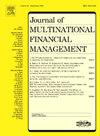Economic freedom and market resilience: Safeguarding liquidity in times of crisis
IF 4
3区 经济学
Q2 BUSINESS, FINANCE
Journal of Multinational Financial Management
Pub Date : 2025-06-21
DOI:10.1016/j.mulfin.2025.100918
引用次数: 0
Abstract
This study examines the link between the liquidity of non-U.S. stocks listed on the NYSE and the economic freedom of their home countries, with a particular focus on the COVID-19 pandemic. The key hypothesis suggests that greater economic freedom enhances stock liquidity by reducing information asymmetry and transaction costs. The findings confirm that stocks from countries with higher economic freedom exhibit narrower bid-ask spreads, lower price impacts, and reduced information-based trading, indicating improved market efficiency. Additionally, the study finds that economic freedom played a crucial role in maintaining liquidity and market stability during the pandemic. Countries with stronger financial, investment, and trade freedom experienced smaller declines in liquidity, suggesting that regulatory flexibility and transparent financial systems helped mitigate the effects of external shocks. These results highlight the importance of economic freedom in fostering resilient financial markets and reducing market disruptions during crises. The study provides practical implications for policymakers, investors, and financial institutions by emphasizing the need to promote economic freedom through transparent regulations, investor protections, and efficient market structures. Ultimately, the research supports the idea that higher economic freedom not only enhances financial market efficiency in normal conditions but also acts as a stabilizing force in times of economic uncertainty and global crises.
经济自由和市场弹性:在危机时期保障流动性
本研究考察了非美国货币的流动性之间的联系。在纽约证券交易所上市的股票和本国的经济自由,特别关注2019冠状病毒病大流行。关键假设认为,更大的经济自由度通过减少信息不对称和交易成本来提高股票流动性。研究结果证实,经济自由度较高的国家的股票表现出更小的买卖价差、更低的价格影响和更少的信息交易,表明市场效率提高。此外,研究发现,在疫情期间,经济自由在保持流动性和市场稳定方面发挥了至关重要的作用。金融、投资和贸易自由度较高的国家流动性下降幅度较小,这表明监管灵活性和透明的金融体系有助于减轻外部冲击的影响。这些结果突出了经济自由在培育有弹性的金融市场和减少危机期间市场中断方面的重要性。该研究强调了通过透明的监管、投资者保护和有效的市场结构来促进经济自由的必要性,为政策制定者、投资者和金融机构提供了实际意义。最终,该研究支持了这样一种观点,即更高的经济自由度不仅在正常情况下提高了金融市场的效率,而且在经济不确定和全球危机时期也起到了稳定力量的作用。
本文章由计算机程序翻译,如有差异,请以英文原文为准。
求助全文
约1分钟内获得全文
求助全文
来源期刊

Journal of Multinational Financial Management
BUSINESS, FINANCE-
CiteScore
7.30
自引率
4.80%
发文量
25
审稿时长
30 days
期刊介绍:
International trade, financing and investments have grown at an extremely rapid pace in recent years, and the operations of corporations have become increasingly multinationalized. Corporate executives buying and selling goods and services, and making financing and investment decisions across national boundaries, have developed policies and procedures for managing cash flows denominated in foreign currencies. These policies and procedures, and the related managerial actions of executives, change as new relevant information becomes available. The purpose of the Journal of Multinational Financial Management is to publish rigorous, original articles dealing with the management of the multinational enterprise. Theoretical, conceptual, and empirical papers providing meaningful insights into the subject areas will be considered. The following topic areas, although not exhaustive, are representative of the coverage in this Journal. • Foreign exchange risk management • International capital budgeting • Forecasting exchange rates • Foreign direct investment • Hedging strategies • Cost of capital • Managing transaction exposure • Political risk assessment • International working capital management • International financial planning • International tax management • International diversification • Transfer pricing strategies • International liability management • International mergers.
 求助内容:
求助内容: 应助结果提醒方式:
应助结果提醒方式:


